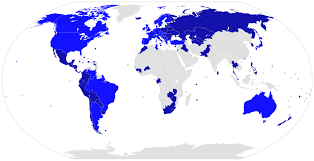Monthly Archives: July 2018
 20
20Jul
How to Serve a Person in a Foreign Country
One of the most important procedures in any Court proceeding is giving a third party notice that a lawsuit has been filed against them, i.e. effecting service of process. Because it is common for Defendants who know about the lawsuit to intentionally dodge service, Courts will allow the Plaintiff to effect service through alternative means, such as by publication. A more difficult problem arises when the Defendant is trying to dodge service and is located in a foreign country.
Prior to 1969, if a party to a lawsuit wanted to serve an individual in a foreign country, the person was required to comply with the laws of the country as it pertains to service. As one might expect, the laws regarding service of process varied greatly from country to country. With the lack of consistency in mind, member states of the Hague Conference on Private International Law signed the Hague Service Convention in 1965. As of today, there are 73 member states.
The goal of the Hague Convention was to provide a simple way for parties to serve individuals in different countries. To that end, all contracting parties agreed to designate a central authority to accept requests for incoming service. For example, in the United States, the designated central authority is the United States Department of Justice.
In addition to providing a central authority to accept requests for service, the Hague Convention also provides for alternative services if the person cannot be served personally. However, member states are allowed to opt out of certain types of service that they do not find sufficient. That is one of the reasons why it is important to double check with the appropriate authority before moving forward with international service via alternative means.
Although serving an individual in a different country presents an obstacle, it does not make service impossible. If you have any questions with serving someone in a different country, call our office to speak with one of our attorneys today.
 13
13Jul
New Paid-Time-Off Law in Arizona
In November 2016, the Arizona voters passed Proposition 206: The Fair Wages and Healthy Families Act (“the Act”). The Proposition received a tremendous amount of media attention because of the increase of minimum wage. According to the Proposition, minimum wage was scheduled to rise from $8.05 to $10 per hour in 2017, to $10.50 in 2018, $11 in 2019 and $12 in 2020. What many Arizona voters did not know was that there was a second part to the Proposition that addressed mandatory employer-provided sick leave.
Although many employers offered Paid-Time-Off (“PTO”) to employees prior to November 2016, they were not required to do so. Starting July 1, 2017 or the commencement of employment, whichever is later, all employers in Arizona are required to provide PTO to their employees.
The Second part of Proposition 206 has since been codified as A.R.S. §23-372. The statute itself is also separated into two parts: employers with 15 or more employees and employers with less than 15 employees. In part, the law states that an employee who works for an employer with 15 or more employees is entitled to a minimum of one hour of earned paid sick time for every 30 hours worked, but that the employee cannot accrue more than 40 hours of earned paid sick time per year. Employees who work for an employer with less than 15 employees is still entitled to one hour of paid sick time for every thirty hours worked but the maximum hours the person can accrue is 24 hours per year. Although the terms of the law seem straightforward, it becomes more nuanced when for instance, the employer already offers PTO, the employee is exempt under the Fair Labor Standard Act, or the employee transfers within the organization to a different department.
Like it does for the Arizona’s minimum wage requirements, the Arizona Industrial Commission will now enforce the law’s paid sick requirements. As such, The Industrial Commission has the authority to levy civil penalties against employers who violate the paid sick requirements.
Whether you are an employee or employer, it is important to be cognizant of your rights and responsibilities under the new law. If you have any questions, call our office for a free consultation.
 10
10Jul
Spousal Maintenance in Arizona
If you or someone you know is currently or about to be involved in a divorce action, it is likely that you will hear the person mention the term, “spousal maintenance”. In different states, spousal maintenance is often referred to as “alimony”. Spousal maintenance is what a Court orders one spouse to pay to the other during and/or after the divorce proceeding. Spousal maintenance is often a source of contention during a divorce because unlike child support in Arizona, the judge does not use a guideline calculator to determine how much (if any) spousal maintenance should be awarded to a spouse.
Under Arizona law, a judge is not required to award spousal maintenance to either spouse. The decision to award spousal maintenance is left to the sole discretion of the judge after taking into account various factors and applying the facts. The issue of spousal maintenance is a two-part test for the Court. The judge must determine:
(1) Whether either spouse is eligible to be awarded spousal maintenance; and
(2) If the spouse is eligible, how much and for how long the spouse should receive in spousal maintenance.
A.R.S. § 23-319 is the Arizona statute law governing spousal maintenance. The statute contains all of the factors a court will consider before deciding a spousal maintenance issue. To determine whether a spouse is entitled to spousal maintenance, the court will consider factors like whether a spouse lacks sufficient property to provide for his/her  reasonable needs, whether he/she lacks earning ability in the labor market, and whether he/she contributed to the educational opportunities of the other spouse. In order to determine the amount and duration of spousal maintenance, the court will look at (among others), the duration of the marriage, the standard of living established during the marriage, the age, and the emotional condition of the spouse seeking maintenance.
reasonable needs, whether he/she lacks earning ability in the labor market, and whether he/she contributed to the educational opportunities of the other spouse. In order to determine the amount and duration of spousal maintenance, the court will look at (among others), the duration of the marriage, the standard of living established during the marriage, the age, and the emotional condition of the spouse seeking maintenance.
In Arizona, spousal maintenance is not a science. A judge listens to evidence and applies certain factors the Arizona legislators have deemed important in his or her determination. The judge is also free to give one factor more weight compared to others. That is one reason why it is important to seek legal advice from an experience family law attorney when involved in a dissolution of marriage case.
If you or someone you know have questions about spousal maintenance, or family law in general, contact our office to schedule free consultation with one of our attorneys at (602)230-1393 .